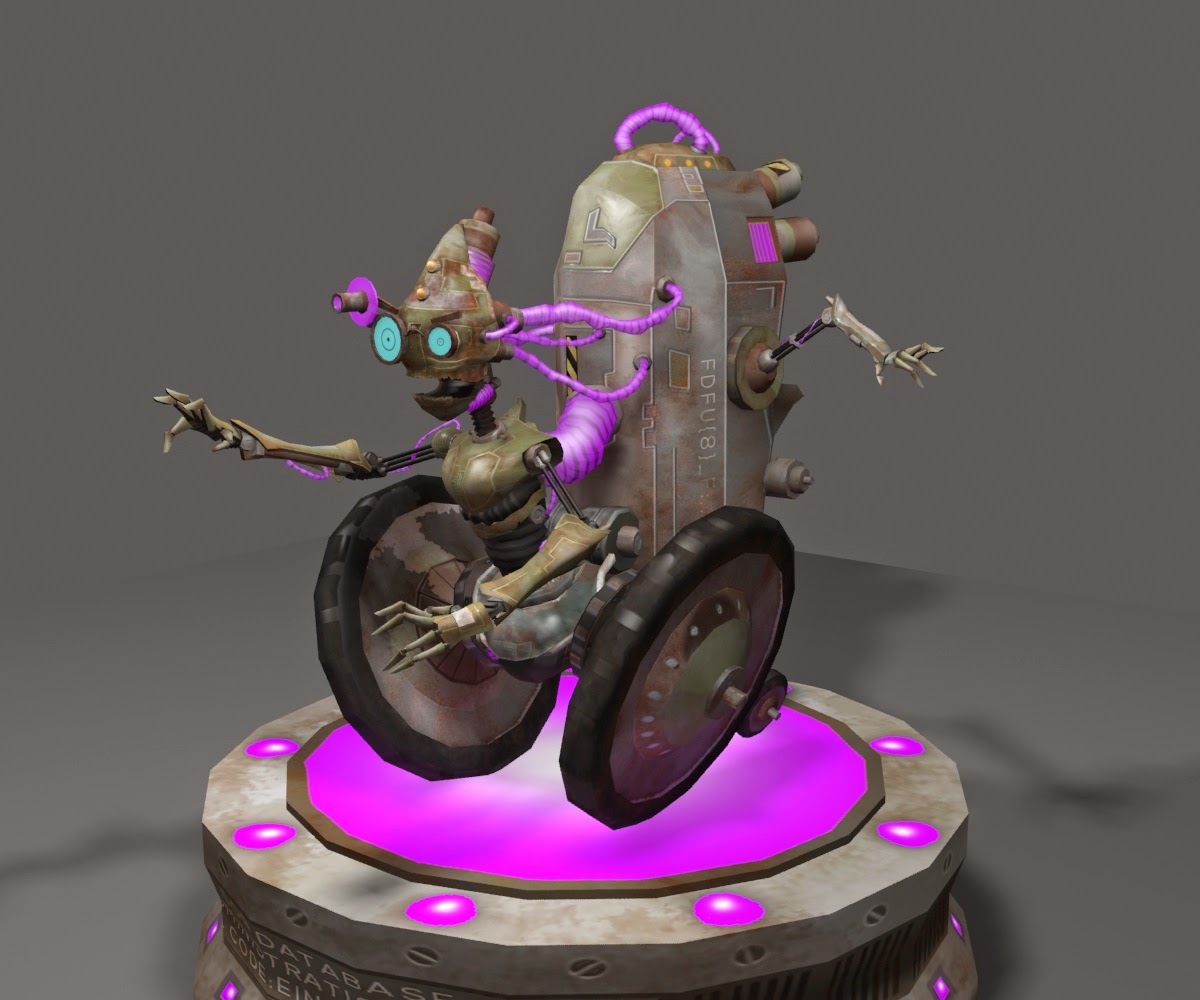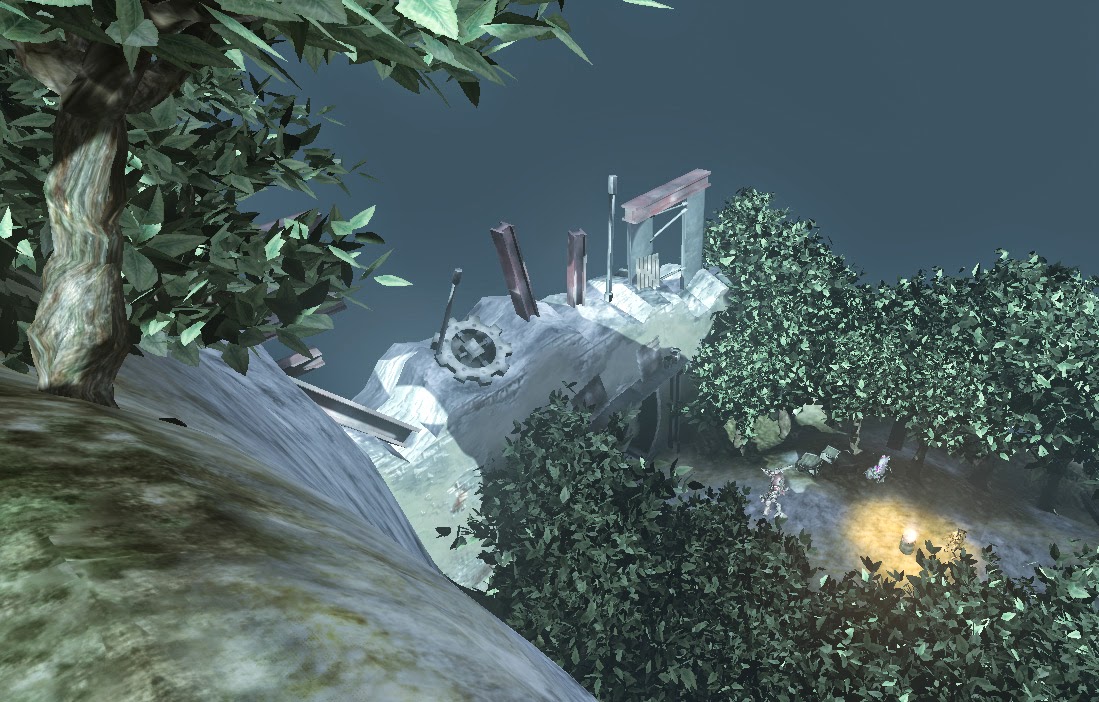Also, with a focus on hard-surface characters for my project, I learnt about the importance of structure and engineering and how that applied to modelling, and making things look believable with the use of rightly applied smoothing groups and also clever use of instancing, but not to the degree where it becomes obvious. With Sprocket, I would have loved to have work on his animations so that he interacted with his props, such as taking out his pipe or swinging his arc-welder tool around! Originally planned to change the in-engine player to Sprocket's mesh also, but obvious time constraints prevented this.
Leo.... Probably the character I made that I had the least problems with in the creation progress, and who I have a soft spot for because of his gentle giant persona....... I'm quite proud with how his personality has been able to make the transition from sketch to 3D, as I was able to not have to make any allowances or changes to my original idea. With Leo, I was really able to fine tune my texture creation process, whereas before I had struggled with getting specular's looking right no matter how many times I went back to the drawing board.... and by no means are they perfect, but I think considering what my skills were like at the beginning of the project with such things, I think working through it on Leo has definitely helped me a lot, and I think it shows on the quality of his surface material. Leo also helped me expand on my knowledge of the CATRig method of rigging bones to my characters, as I had brushed on it first time with Sprocket, but it was due to Leo's more unique body shape that I came to grips with adapting the rig method to suit my needs. I also think the inclusion of his own teddy bear sat atop his shoulder was a nice touch, that I think works really well (other than the fact that it would most likely fall off.... but just go with it).
 Hmmmm, Steinton...... the character that gave me the most grief in terms of his creation progress. I should have known that creating a character that wasn't a straight forward biped would lead to difficulties, but my persistence in making a wider variety of robot types stuck through until it was actually too late. Nevertheless, I think that by sticking with it, I was able to solve (or at least learn new things) new problems in the process. The most obvious issue I had with Steinton was because of him having wheels it meant that he couldn't be rigged the normal way, or at least make his wheels apart of his rig.... I had to animate those separately. And just the fact that the wheels were tilted to be more unique, meant that they HAD to be separate meshes (If I had made them attached and wanted to rotate them, I would have literally had to make the wheels a 90 degree angle losing their jauntiness for it to work... something I think took too much personality out of the character), which led to me looking up hierarchy systems and making the wheels child element's to the rest of the mesh and rig, until it finally all worked... no more leaving his wheels behind, all spinning aimlessly on their own. One thing that probably still bugs me about Steinton, is his colour scheme..... in a way it was meant to be more drab and boring to show his origins as a boring data sorting droid.... But I would have liked more time to try out a bigger variety of surface styles and colours, as I think it lacks something that makes it 'pop' (even with ambient occlusion added).
Hmmmm, Steinton...... the character that gave me the most grief in terms of his creation progress. I should have known that creating a character that wasn't a straight forward biped would lead to difficulties, but my persistence in making a wider variety of robot types stuck through until it was actually too late. Nevertheless, I think that by sticking with it, I was able to solve (or at least learn new things) new problems in the process. The most obvious issue I had with Steinton was because of him having wheels it meant that he couldn't be rigged the normal way, or at least make his wheels apart of his rig.... I had to animate those separately. And just the fact that the wheels were tilted to be more unique, meant that they HAD to be separate meshes (If I had made them attached and wanted to rotate them, I would have literally had to make the wheels a 90 degree angle losing their jauntiness for it to work... something I think took too much personality out of the character), which led to me looking up hierarchy systems and making the wheels child element's to the rest of the mesh and rig, until it finally all worked... no more leaving his wheels behind, all spinning aimlessly on their own. One thing that probably still bugs me about Steinton, is his colour scheme..... in a way it was meant to be more drab and boring to show his origins as a boring data sorting droid.... But I would have liked more time to try out a bigger variety of surface styles and colours, as I think it lacks something that makes it 'pop' (even with ambient occlusion added).
Timescale wise, regardless of running out of time to do several things that I wanted (animating characters in engine, more scene props, creating idle animations for each character, etc), I think I did especially well to not only concept, and model three characters that I had planned out to do, but also fully rig them all with walk cycles and get them into a full scene in engine, something that a few weeks ago I thought I would have no time to do... and was in fact recommended that I maybe consider doing only two characters, so that I could spend more time polishing them up and working on my scene. I'm glad I stuck to my guns though, and regardless of the constant work and obstacles, I managed to overcome most of them to come out with an end result I'm really proud of.
Creating a particle system for my fire was another extra thing that wasn't really part of my original brief, but that I put time aside for to create that extra bit of atmosphere and to really set the scene with my characters. It adds a drawing point to the scene that brings your eyes inwards, towards the gathering point of the three droids.
Another issue that still annoys me regardless for having no time to resolve it now: The bloody light maps only working for Sprocket. Would have loved to sort out both Leo's and Steinton's as it works really well in reflecting the warm glow of the fire light. But never-mind, at least it managed to work for at least one of my characters, and is a process I have learned now with the creation of physic-assets.

The end result of this project, is hard to talk about at this stage. Exhausted and sleep deprived, I feel like I've just had enough of it at this point. However, If i try to separate my thoughts on it away from my current mental state, I think it is definitely a great representation of my culmination of work here at Dmu.... Looking at all my characters in engine, it's hard to decipher that It is something made by someone who struggled to model a wheelie bin, never mind fully rig characters into an entire scene in engine, but I guess it is evidence of the amount I have learned in what feels to me a very short amount of time.
I think I have achieved pretty much everything I initially set out to do with this project, and I'm glad that I persevered with making sure my original characters retained their appearance throughout the transition into 3D and beyond. The one aspect I regret, if any, Is that I set out in my original brief to create quite a lot of 2D compositions as part of this projects concept period, however due to me taking on quite a lot of extra work and processes to make sure I have all of my characters to the point I am happy with them in 3D as well as all of the scene creation in engine, I wasn't able to fit that in. However this isn't really something that reflects badly ion the project, as even though this is over, I am planning on using the end result as a basis with with which to create some really nice portfolio pieces.






































